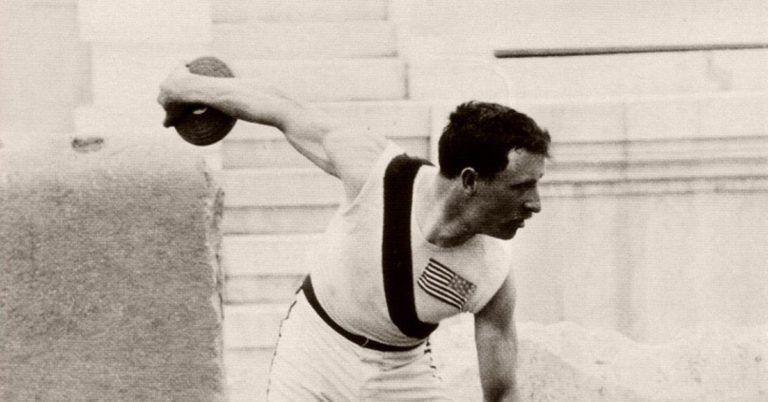1896 Olympic discus champion brought Scouting to Baltimore in 1910

I’ve told you about 2016 Olympians with Scouting ties, but today we step back 120 years to uncover Scouting connections at the very first Olympics of the modern era.
In 1896 in Athens, Robert Garrett of Baltimore became the first modern Olympic champion in discus throw and shot put.
The gold medal in discus was especially noteworthy because he beat the Greeks, in Greece, at a sport they invented. Not bad for someone who had never even seen a regulation discus before arriving in Athens.
In 1910, building off a career in outdoor recreation, Garrett brought the new Boy Scouts of America to Baltimore.
Garrett spent the next 25 years of his life — and heaps of his personal money — growing what’s now called the Baltimore Area Council.
He made sure Baltimore Scouts attended the BSA’s first encampment in August 1910. He welcomed Ernest Thompson Seton and Robert Baden-Powell to his city. And he is named in the BSA federal charter of 1916.
In 1931, Garrett became a member of the first class of Baltimore Scouters to receive the Silver Beaver Award — adding that medal to the six Olympic medals he earned in 1896 and 1900.
I first learned of Robert Garrett’s story from Baltimore Scouter J.D. Urbach.
Urbach is compiling an early history of Scouting in Baltimore and tells me he found “lots of great stories and connections, but this is one of my favorites.”
I’ll let Urbach take it from here.
Baltimore’s first Olympian was also its founding Scouter
By J.D. Urbach
When the first Olympic Games of the modern era were held in 1896, the United States was represented by 13 athletes. Among them was 20-year-old Robert H. Garrett (1875 – 1961) of Baltimore.
Garrett, a junior at Princeton, won gold in both shot put and discus and silver in high jump and long jump. He would return to the 1900 Paris Olympics, winning bronze in shot put and the standing triple jump, bringing his total Olympic medal count to six.
Garrett became an early leader in the creation of public recreational facilities in Baltimore. He later served as chairman of Baltimore’s Department of Recreation and as the first chairman of the city’s combined Department of Recreation and Parks.
His prominence in the field of outdoor recreation lead to his invitation to the June 21, 1910, organizational meeting of the Boy Scouts of America, held at the headquarters of the YMCA in New York.
A philanthropist and explorer, Garrett ensured that boys from Baltimore were in attendance at the “first encampment” of the BSA, conducted by famed naturalist Ernest Thompson Seton in August 1910 at Silver Bay in Lake George, N.Y.
Garrett recruited Henry Laurence Eddy from the YMCA to be the Scout Commissioner (now called the Scout Executive) for Baltimore, granting charters to the first seven troops on Sept. 9, 1910.
Garrett incorporated the “Maryland Council of Boy Scouts of America” on May 9, 1911 and served as Council President until 1919.
He personally welcomed Seton to Baltimore in 1911 and Baden-Powell in 1912.
Garrett served on the BSA National Executive Board from 1912 until 1919 and is named in the BSA federal charter of 1916.
Garrett formally retired from active Scouting in 1934 after nearly 25 years guiding (and largely funding) the growth of the Baltimore Area Council.
He was the first of nine Baltimore men to receive the Silver Beaver award during its inaugural presentation in 1931 — adding one more distinction to the impressive medal collection he had begun in Athens 35 years earlier.
